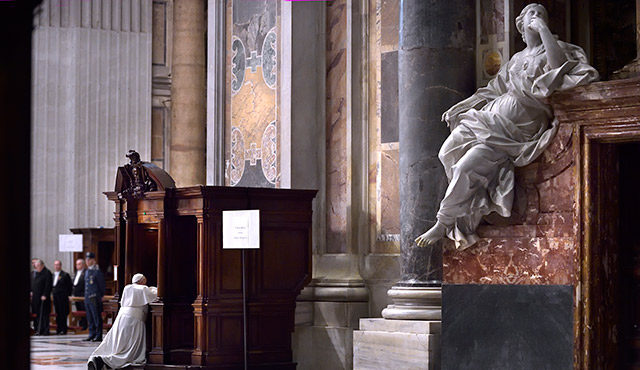Gunshots thundered through St. Peter’s Square on May 13, 1981. Four bullets struck Pope John Paul II in the abdomen, barely missing his heart. He fell to the ground as the crowd scattered in panic.
The man who fired the gun, Mehmet Ali Agca, was quickly arrested and later sentenced to life in prison by an Italian court. Agca had attempted to kill a man he had never met but, instead of condemning his actions, the pope visited Agca’s dusty prison cell and forgave him.
Through the Sacrament of Reconciliation, Catholics are reminded “that God’s saving love is more than their sinfulness,” says Father Gerry Horan, Vicar for Faith Formation for the Diocese of Orange.
Also commonly known as confession or penance, the Sacrament of Reconciliation includes confession, contrition, absolution and acts of penance. The act of confessing sins privately to a priest arose after the seventh century and became widespread by 1215 at the time of the Fourth Lateran Council.
“Even after we are baptized (which grants us forgiveness from the state of original sin), a Christian can fall into sin or ‘stray from the path of faith’ by offending God or neighbor,” says Father Gerry. “Each of us is a pilgrim on a journey; we are guided by the light of faith. On that journey, we struggle with our own weakness and fault. Sometimes we fall into sin. In such moments, we need to rely upon God’s forgiving grace.”
Church documents name an oratory or church as the proper place for the Sacrament of Penance. However, Father Gerry added that the Church allows priests to use their own judgment in administering the sacrament whenever needed, no matter the location.
“The sacrament grants true forgiveness to the sincere and repentant sinner, which will give them peace of heart and ease their troubled conscience,” says Father Gerry. “By this sacrament a Christian is freed from sins committed after baptism. Although minor transgressions (venial sins) are remitted through participation in prayer and Eucharist, mortal sins should be brought to God thorough this sacrament.”
Although all Catholics are encouraged to avail themselves of the Sacrament of Reconciliation, not everyone does so in the same way. The Center for Applied Research in the Apostolate (CARA) found some interesting statistics while researching confession in 2008.
For the report, respondents were asked how often they went to confession. About one in eight Catholics did so once a year and only 2 percent confessed each month.
Additionally, there are differences by generation. Forty-two percent of pre-Vatican II Catholics took part in reconciliation once a year, compared to 27 percent of millennial-aged Catholics. The findings also reported that older Catholics are more likely to agree that forgiveness requires confession with contrition than do younger generations.
Also, about 33 percent of Catholics said they believe they could be good Catholics without celebrating the Sacrament of Reconciliation at least once a year.
For those who may fear judgment or condemnation during confession, Father Gerry offered encouraging words: “It is difficult for any person to talk about their failings or faults. It is hard to admit that we are not perfect. Many people might be embarrassed by their sins. Perhaps they were the cause of some harm to another or acted out of ill will. But the Sacrament of Reconciliation is a ‘safe place’ where they should find hope and forgiveness, rather than judgment or rejection.”
He added that some Catholics may associate confession with a bad experience – possibly feeling judged or castigated – or they may be harboring guilt about past events. “Such bad memories don’t disappear quickly,” says Father Gerry. “It’s not uncommon to hear the confession of a person who was mistreated and who then stayed away from the sacrament for 15 or 20 years.”
Most priests understand how hard it can be for people to admit personal failings, says Father Gerry. He recalled the story of the woman caught in adultery in the Gospel of John, Chapter 8. Jesus simply told her to “go and sin no more.” Jesus offered the woman compassion without harsh judgment and punishment, and priests are called to offer the same.
“The Sacrament of Penance offers hope and healing to people who are guilt-ridden, distressed or remorseful about past failings,” says Father Gerry. “This is why Pope Francis has made a public example of his own participation in the sacrament. He has also recently emphasized the availability of forgiveness and the ability of priests to forgive the sin of abortion, in order to make all Catholics aware that God’s forgiveness is available ‘for the asking.’”

